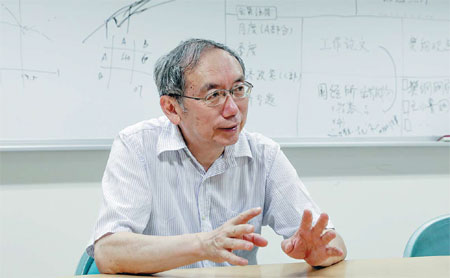Rebalancing seen in 10 years
Updated: 2014-07-25 09:21
By Andrew Moody (China Daily Europe)
|
|||||||||||
|
Wang Xiaolu believes there are huge risks for the Chinese economy if it fails to rebalance. Hua Yu / for China Daily |
Economist says income inequality has to be reduced to avoid 'huge crisis'
Wang Xiaolu believes the latest economic data provides evidence the Chinese economy is rebalancing.
The 63-year-old is deputy director of the National Economic Research Institute, a leading independent think tank, and one of China's most widely respected economists.
The National Bureau of Statistics data, published on July 16, showed that services, and not manuacturing, continued to be the major driver o growth or the second quarter in a row. It made up 48.9 percent of additional GDP, compared with the secondary sector's 47.1 percent.
"I think you can see some initial rebalancing of the economy over the past couple of years. No one quarter would define rebalancing since it is very much a long-term, rather than short-term process," he says.
Wang was speaking in the offices of the NERI in the Xicheng district of Beijing, where he has worked for the past 16 years. Various seemingly incomprehensible calculations are scrawled on the whiteboard behind him.
He believes there is some initial evidence of the government's attempts to rebalance the economy working but implementation of reforms will still present a challenge.
Consumption as a proportion of GDP has to rise from its 2013 level of 49.8 percent to at least 60 percent for significant rebalancing to have occurred, according to Wang, and that will take at least 10 years and probably longer.
"I expect it will gradually happen over the next 10 years but it will depend on the success of institutional reforms as to how the patterns of income distribution will be readjusted," he says.
Wang, who twice has won the Sun Yefang Economics Prize (named after the Chinese economist who was one of the first to advocate market reforms), is regarded as a leading expert on consumption and income distribution.
His book, Strategic Thinking on National Income Distribution, won the most influential book award in the CITIC press awards in 2013.
Wang believes there are huge risks for the Chinese economy if it fails to rebalance.
"The continuation of the current situation would result in a very bad situation for China because current levels of economic growth would not be sustained. It would lead to many problems such as a lack of funding for public services, debt issues and also higher levels of unemployment."
The economist is also skeptical that any meaningful rebalancing could occur if the economy suffered an investment bust.
But a Peking University finance professor, Michael Pettis, argues in his latest book, Avoiding the Fall, that the economy would naturally rebalance if in a worst case scenario it crashed.
"I don't think you can expect the whole process of rebalancing to depend on collapse of investment. This would not lead to a long-term rebalancing. What we need for rebalancing is a lower savings rate and lower investment rate, and higher household consumption and these need to be permanent features," Wang says.
He says any hope of rebalancing in China was delayed by the financial crisis, which led to the Chinese government responding with a 4-trillion yuan ($660 billion) stimulus, one of the largest in history, which worsened the existing imbalances.
"Many government investment programs resulted in bubbles and debt problems. We need to learn lessons from the financial crisis because there was certainly over-investment in the economy."
For Wang, it also exposed a local government funding problem (many cities and towns in China remain seriously in debt), which needs to be resolved as part of the rebalancing process.
"Local governments rely too much on land sales for funding. It is not sustainable because land is limited and you cannot sell it forever. Land sales are not well monitored or transparent. Local governments need to be able to raise money in local taxes and be less reliant on central government," he says.
The government unveiled its 10-year plan for the country at the Third Plenum of the Party last October, and at the annual Central Economic Work Conference, that followed two months later, the detailed reforms for the current year were outlined.
As part of rebalancing, the government set out plans to reform the social security and health systems, which would give people more confidence to spend or consume and not save for future rainy days.
It also annouced reform of the hukou, or household registration scheme, so that migrant workers can live proper lives in cities, bringing their families with them and consuming more rather than just remitting money back to their home areas.
"Government spending is not necessarily wrong and can help the rebalancing. If the government can spend more on the social security system and improved healthcare and provide better housing, it could have the effect of increasing household consumption and making the economy more balanced."
Wang also sees the government's current anti-corruption measures, which restrict the hospitality budgets of officials and their receipt of gifts, as part of the rebalancing efforts.
"In the short run it may have some negative impact on economic growth because government consumption will be reduced, but you cannot rely on corruption to drive consumption."
Wang, brought up in Beijing and the son of government officials himself, is one of the generation of Chinese academics who endured the "cultural revolution" (1966-76).
He was sent to the countryside in Shanxi province in northern China at the age of 17 in 1968 and was away from home for seven years, spending the latter part of his time away in an aluminum smelting factory.
"I think I actually benefited from it. I experienced a very different life from the one I was used to and therefore had a better knowledge of society. I actually converted myself into a farmer during that period and learned a lot about agriculture."
When he returned to Beijing, unlike many of his contemporaries he was not one of the first post-revolution university entrants but instead in 1978 he joined the Chinese Academy of Social Sciences, where he worked as an editor on social science journals.
It was not until he went to Australia, initially as an academic visitor, in the late 1980s that he began his studies, staying on at the Australia National University in Canberra, where he did his bachelor's and master's and then a PhD in economics.
He still maintains strong links with ANU and spoke earlier this month at its 24th Chinese Economics Society conference, Balance and Harmony in China's Economic Development".
Wang has been influential in his work at the NERI, which was originally founded by the China Reform Foundation, another independent think tank.
He has published numerous papers and no fewer than 10 books, three of which have been published in English.
Much of his work has been in the area of income distribution and Wang says one of the big problems with China's lack of household consumption expenditure is income inequality, which is not just about rich people buying yachts but also a divide between urban and rural dwellers.
"One of the worst inequalities is between people living in rural and urban areas. Someone in a rural area receives an average pension of 80 yuan a month, whereas in an urban area this is 1,600 yuan a month. You also have the problem of rural migrant workers not having access to urban social security systems in urban areas.
"If you can improve this situation, you not only find that people on low incomes benefit but the whole nation as well since with a better income distribution, you will have a more balanced economic structure."
Wang says he has no problem with people getting wealthy in society so long as they do so by transparent means. He sees people like Jack Ma, the former English lecturer who started China's biggest Internet business, Alibaba, as role models.
"If people start a business, work hard, earn a large income and get rich, that is fine. China needs people who can earn money in the market," he says.
For Wang it is imperative China addresses issues of income inequality and achieves a more balanced economy with a greater role for consumption unless it is to suffer the fate of many Latin American economies and become ensnared in the middle-income trap.
"If the economy does not rebalance, this seems very possible to me. If you look at what has happened to these countries in the middle-income trap, they have had a lot of instability with negative consequences for economic growth."
andrewmoody@chinadaily.com.cn
(China Daily European Weekly 07/25/2014 page8)
Today's Top News
TransAsia crash while landing in Taiwan
UK fraud office liaising with China on GSK bribery case
Death toll in Gaza mounts to 701
Meat supplier in global crisis
Dogs 'capable' of feeling jealousy
Five detained over stale meat scandal
5 more universities set up human rights centers
Rebels likely downed jet 'by mistake'
Hot Topics
Lunar probe , China growth forecasts, Emission rules get tougher, China seen through 'colored lens', International board,
Editor's Picks

|

|

|

|

|

|






